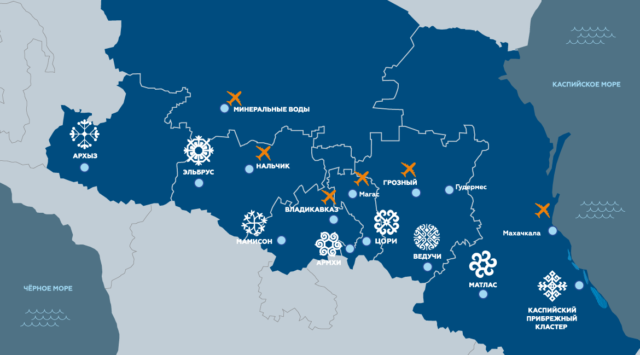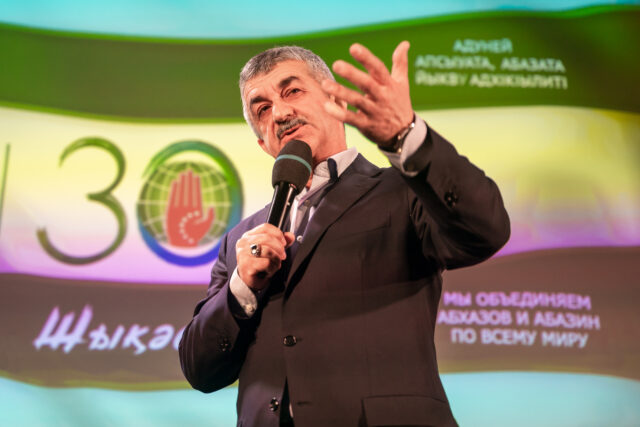North Caucasus Today Between Ethnic Minorities, Indigenous People and Economic Development: An Interview with Mussa Ekzekov

Kavkaz Files ISSN 2975-0474 Volume 20 Issue 2
Author: Giuliano Bifolchi
The North Caucasus holds a pivotal position in the intricate tapestry of Russian geopolitics, serving as both a crucial ‘bridge’ connecting Europe and Asia and a ‘natural barrier’ demarcating the realms of Christendom and Islam. With a population exceeding 9 million, this multiethnic and multi-confessional region has long been under the global spotlight, predominantly for its security challenges rather than the economic opportunities and cultural richness it harbours.
In July 2023 SpecialEurasia delved into the key aspect by visiting Cherkessk in the Republic of Karachay-Cherkessia within the North Caucasus Federal District. The occasion was the Forum of Indigenous Peoples of the Russian Federation, where our team could discuss with Mussa Khabalevich Ekzekov valuable insights into the dynamics of the North Caucasus.
Ekzekov, Deputy Chairman of the People’s Assembly (Parliament) of the Republic of the Karachay-Cherkessia, Chairman of the Higher Council of the World Abaza-Abkhaz Congress, and President of the nonprofit organization ‘Alashara’, focused the attention on regional ethnic minorities, indigenous populations, and ongoing local socioeconomic development initiatives.
How could you assess the current situation of the North Caucasus regarding economy and society?
“The current economic and civil society situation in the North Caucasus is multifaceted. In the difficult years following the collapse of the Soviet Union, the region has undergone significant positive changes. It is important to note that the North Caucasus is not a homogeneous entity, and living conditions in different republics and territories may differ.
Economically, the region has seen major improvements in recent years. The economic development of the North Caucasus is facilitated by the “Strategy-2025” approved by Russian President Vladimir Putin, which is aimed at improving the economic situation in the region. Putin, aimed at improving living conditions and creating jobs. Under the current leadership of the Republic of Karachay-Cherkessia, positive changes are occurring at the level of the entire country, especially in rural areas, where the infrastructure is being restored, which even in the times of the great USSR did not happen. Throughout the past decade, there has been active construction of kindergartens, culture houses, sports complexes, museums, cultural centers, and hospitals.
Investments in infrastructure, tourism and industry have played an important role in stimulating economic growth. In addition, the region’s rich natural resources, such as energy reserves and agricultural land, attract investment and contribute to economic diversification.
In terms of society, the North Caucasus is a culturally diverse and therefore very rich region. The region is home to many ethnic minorities and indigenous peoples, each with their own traditions, languages and identities. Efforts are being made to preserve and develop this cultural heritage.”
What is the current status of the Russian legislation about protecting ethnic minorities and indigenous people?
“The status of Russian legislation on protecting ethnic minorities and indigenous peoples is one of the most important aspects of the country’s approach to stability and cultural diversity. Russia has several laws and programs aimed at preserving the traditional way of life of ethnic minorities and indigenous peoples. These laws recognise the importance of preserving and developing their languages, traditions and identity.
One significant piece of legislation is the Federal Act on Guarantees of the Rights of Small Indigenous Peoples of the Russian Federation. This law defines the rights of indigenous peoples, including rights to land and resources, and aims to protect their cultural heritage. In addition, Russia is a signatory to international conventions such as the UN Declaration on the Rights of Indigenous Peoples, which is the basis of its domestic policy.
However, the effectiveness of these laws and policies can vary from region to region, and in ensuring that the rights of ethnic minorities and indigenous peoples are fully respected and realised, there are several mechanisms that need to be further developed. And we, through the work of Alashara and World Abaza Congress (WAC), are actively working to improve mechanisms for the preservation and development of ethnicity – a universal method suitable for any ethnic group.
In one of your books, you discussed the difference between multiculturalism and national-cultural autonomy. Could you tell us more?
“Russia has the institution of the federal national-cultural autonomy, a concept that emphasises the cultural and political autonomy of various national or ethnic groups within the Russian Federation. It allows these groups to manage their cultural and educational institutions independently, to a certain extent, with financial support from the government.
In the context of the North Caucasus, we, the Abazins or Abaza, are an indigenous small-numbered people of Russia, and we are in the process of registering a federal national-cultural autonomy. While the process of harmonisation and compliance with the procedures enshrined in the legislation is underway, we, for our part, are conducting systematic work to preserve traditions, culture and language within the framework of NGO Alashara projects.”

What are the major activities and the purpose of Alashara and the World Abkhaz-Abaza Congress?
“ ‘Alashara’ and the World Abaza Congress, headed by me, play an important role in popularising and preserving the cultural heritage of Abazinians and Abkhazians.
‘Alashara’ is an international association to promote the development of the Abazin-Abkhazian ethnos. For over 10 years in Abazin villages of Karachay-Cherkessia, a program of preservation and development of ethnos is being implemented. Moreover, the Alashara team is actively involved in initiatives to strengthen civil society and improve the social status of the Abazins.
The World Abaza Congress unites Abkhazians and Abazins around the world. Since March 2018, the method used by the Alashara team has been successfully applied to the territory of the Republic of Abkhazia in all major population centres. We have opened 59 representative offices across the country and together with the residents, we are implementing a program of civil society development, based primarily on the traditions and culture of the Abkhaz people. Moreover, within the framework of Alashara and the Congress, discussion clubs have been established to serve as a platform for discussing topical issues related to the preservation and development of the tangible and intangible cultural heritage of the Abkhaz-Abaza people.”
As a member and deputy chairman of the Karachay-Cherkess Parliament, how do you assess the situation of this North Caucasian republic? Do you see a substantial improvement from the past?
“Improvements in the region include economic growth, infrastructure development, increased opportunities for residents and greater social stability.
The Parliament actively makes proposals to improve existing legislation and introduce new laws. In 3 years, I alone have introduced 17 bills, which were successfully approved by the members of the Parliament. The entire process of approval is fast and without unnecessary bureaucratic obstacles, all conditions for lawmaking have been created. Moreover, the laws come into legal force from the moment they are adopted by the Parliament.
The Republic of Karachay-Cherkessia hosts the Arkhyz tourist cluster. What are the local tourist potentialities and in which sectors foreign businessmen might invest?
“The Arkhyz tourism cluster has the potential to further attract foreign investment in several sectors of the tourism industry. Potential areas for investment include tourism infrastructure, adventure tourism, cultural heritage tourism, and ecotourism.
In addition, the road from Arkhyz to Abkhazia and the Kabardino-Balkaria will be another major point of attraction. These are hundreds of kilometres, which allow creating ecologically clean tourism and sports facilities along the route.
A large number of fast mountain rivers allow to create ecological hydroelectric power plants that will provide all the infrastructure to be created with necessary energy resources. All this certainly attracts investors, given the actively developing region.”
Since February 2022, the Russian Federation has been involved in the so-called ‘special military operation’ in Ukraine. How has this event affected the North Caucasus?
“The start of the Russian Federation’s special military operation in Ukraine (SMO), which began in February 2022, consolidated the society of Russia’s North Caucasus into a single fist.
We have a clear understanding of the tasks of the SMO. In essence, we are building a defense against those negative trends that are taking place in the West, namely, the destruction of man through the destruction of family and religion. In Russia, and especially in the North Caucasus, family values based on respect for elders and families with many children are better known and respected than anyone else.
Our society looks several generations ahead and sees its future only in the preservation of traditional cultural values. We see strength in culture, native language and traditions. Therefore, despite all the difficulties, tens of thousands of representatives of the North Caucasus region of Russia are at the forefront of the struggle to preserve traditional values on the Ukrainian front, where there is a confrontation not only with Ukraine, but with all NATO countries that actively support the Armed Forces of Ukraine and their Nazi formations.”
Do you like SpecialEurasia reports and analyses? Has our groundbreaking research empowered you or your team? Now is your chance to be a part of our mission! Join us in advancing independent reporting and unlocking the secrets of Eurasia’s complex geopolitical landscape. Whether through a one-time contribution or a monthly/yearly donation, your support will fuel our relentless pursuit of knowledge and understanding. Together, let’s pave the way for a brighter future. DONATE NOW and secure your place in shaping the geopolitical narrative.
